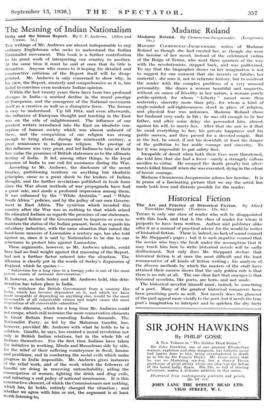The Meaning of Indian Nationalism
Tug writings of Mr. Andrews are almost indispensable to any ordinary Englishman who seeks to understand the Indian Nationalist movement. This book is a further contribution to his great work of interpreting one country to another. At the same time it must be said at once that its title is deceptive. Anyone who comes to it hoping for detailed and constructive criticism of the Report itself will be disap- pointed. Mr. Andrews is only concerned to show why, in his view, the Report, masterly and comprehensive as it is, has failed to convince even moderate Indian opinion.
Within the last twenty years there have been two profound changes in India—a marked decline in the moral prestige of Europeans, and the emergence of the National movement itself as a creative as well as a disruptive force. The former is easy to understand. Up till 1914, and even afterwards, the influence of European thought and teaching in the East was on the side of enlightenment. The influence of our greatest writers introduced into the East an idealistic con- ception of human society which was almost unheard of there, and the competition of our religion was strong enough to bring about, during the nineteenth century, a great renaissance in indigenous religion. The prestige of this influence was very great, and led Indians to take at their face value the promises of British statesmen as to the ultimate destiny of India. It led, among other things, to the loyal response of India to our call for assistance during the War.
According to Mr. Andrews, the disclosure of the secret treaties; partitioning territory on anything but idealistic principles, came- as a great shock to the leaders of Indian thought, and the further revelations published in book form since the War about methods of war propaganda have had a great sale, and made a profound impression among them: It was enhanced by the " White Australia " and " White South Africa ". policies, and by the policy of our own Govern- ment in East Africa. .The cynicism which invaded this country after the War was as nothing to that which seized the educated Indians as regards the promises of our statesmen. The alleged failure of the Government to improve or even to maintain the status of the Indian peasant, faced, as regards his subsidiary industries, with the same situation that ruined the hand-loom weavers of Lancashire a century ago, has also told against us, since it is said by Nationalists to be due to our reluctance to protect him against Lancashire.
These arguments, however, as Mr. Andrews admits, could have had no final weight against the reasoning of the Report, had not a further factor entered into the situation. The dilemma is clearly put in the words of Seeley's Expansion of England, which he quotes
Subjection for a long time to a foreign yoke is one of the most potent causes of national deterioration."
If, however, as both Seeley and Mr. Andrews hold, this dete- rioration has taken place in India,
"To withdraw the British Government from a country like India, which has become dependent on it, and which we have made incapable of depending on anything else, would be the most inexcusable of all conceivable crimes and might cause the most stupendous of all conceivable calamities."
It is this dilemma, which for a long time Mr. Andrews could not escape, which still restrains the more conservative elements in Great Britain from conceding Indian demands. The Nationalist Party, as led by the Mahatma Gandhi, has, however, provided Mr. Andrews with what he holds to be a solution. Gandhi, he says, has created a moral revolution not only in British Indian relations, but in the whole life of Indians themselves. For the first time Indians have taken the initiative in working, Hindu and Mussulman side by side, for the relief of their suffering countrymen in flood, famine and pestilence, and in combating the social evils which make progress in India impossible. Mr. Andrews gives instances of the relief work, and of the work which the followers of Gandhi are doing in removing untouchability, aiding the emancipation of women, fighting the drink and drug evils, and initiating a real policy of national renaissance. It is this constructive element, of which the Commissioners saw nothing, which has, he holds, entirely changed the situation ; and whether we agree with him or riot, the argument is at least worth listening to.










































 Previous page
Previous page